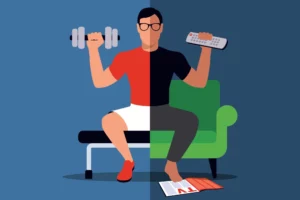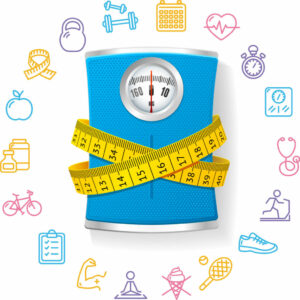Losing weight as a teenager can seem like an impossible task. With so many social pressures and the endless amounts of junk food available, it’s hard to know where to start. But don’t worry, we’re here to help! In this guide, we will discuss the basics of weight loss for teenagers and provide some tips that will help you get started. So whether you’re looking to lose a few pounds or want to drop a dress size before your next school dance, keep reading for helpful advice!
Contents
- 1 Weight Gain During Teenage Years
- 2 Weight Loss Tips for Teenagers
- 2.1 Avoid snacking
- 2.2 Ensure hydration
- 2.3 Plan your meals
- 2.4 Know what to avoid
- 2.5 Nourish your body
- 2.6 Indulge sparingly
- 2.7 Practice mindful eating
- 2.8 Reduce stress
- 2.9 Stay physically active
- 2.10 Set realistic goals
- 2.11 Prioritize fitness over weight loss
- 2.12 Find a support system
- 2.13 Accept your body
- 3 Conclusion
Weight Gain During Teenage Years
It’s no secret that many people gain weight during their teenage years. This is due in part to the fact that your body is going through so many changes during this time. You’re growing taller, your hormones are all over the place, and you might even be eating more than you did when you were younger. All of these factors can contribute to weight gain. Additionally, many teenagers become less active as they get older. They start spending more time sitting in front of a screen (whether it’s a TV, computer, or phone) and less time playing outside or participating in sports. This lack of activity can also lead to weight gain.
Gaining weight as a teenager can lead to a number of health problems, including obesity, type II diabetes, and high blood pressure. Additionally, being overweight can lead to low self-esteem and body image issues. If you’re concerned about your weight or are unhappy with the way you look, it’s important to talk to your parents or a doctor. They can help you develop a healthy weight loss plan that’s right for you.
Weight Loss Tips for Teenagers

Now that we’ve discussed some of the reasons why teenagers gain weight, let’s talk about how to lose it! Here are a few tips to get you started:
Avoid snacking
Snacking involves eating small meals or snacks throughout the day in addition to your regular meals. While snacking can help you control your hunger, it can also lead to weight gain if you’re not careful. It can be tempting to reach for a bag of chips or a candy bar when you’re feeling hungry, but these snacks are usually high in calories and low in nutrients. Instead, try to eat three square meals and avoid snacking in between. To avoid gaining weight, try to limit your snacking to healthy foods like fruits, vegetables, whole-grain bread, or crackers. If you’re really craving something sweet, opt for a piece of fruit instead of candy or cake.
Ensure hydration
Many people mistake thirst for hunger and end up eating when they should be drinking water. If you’re trying to lose weight, it’s important to make sure that you’re staying hydrated throughout the day. Drinking water ensures that your body is functioning properly and helps to keep you feeling full. It’s also a good idea to avoid sugary drinks like soda, juice, and sports drinks. These beverages are often high in calories and can lead to weight gain. Instead, stick to water or unsweetened tea. Aim to drink eight glasses of water each day.
Plan your meals
One of the best ways to lose weight and keep it off is to plan your meals in advance. This way, you can ensure that you’re eating healthy, balanced meals and avoiding unhealthy snacks. Planning ahead will also help you save money and time. Try to make a grocery list each week and only buy the items on it. This will help you avoid buying junk food that you’ll be tempted to eat later on. Additionally, try to cook your meals at home as often as possible. Home-cooked meals are usually healthier than restaurant meals and can help you control your portion sizes.
Know what to avoid
There are also certain foods and eating habits one must avoid for effective weight loss for teenagers. Foods that are high in sugar, fat, and calories should be avoided as much as possible. This includes sweets like candy, cake, and cookies; fried foods; processed meats; and sugary drinks. In addition to sugary drinks and snacks, there are a few other things that you should avoid if you’re trying to lose weight. First, try to limit your intake of processed foods. These foods are often high in calories, salt, and fat and can lead to weight gain.
Additionally, try to avoid eating late at night or skipping meals. These habits can lead to weight gain. Similarly, eating while watching TV or working can cause you to eat more than you would otherwise. If you’re trying to lose weight, it’s important to be aware of these habits and avoid them as much as possible.
Many teenagers also turn to fad diets in an attempt to lose weight quickly. However, most diets are ineffective and can even lead to weight gain. This is because they’re often too restrictive and can’t be maintained over the long term. Instead of going on a diet, focus on making small changes to your eating habits that you can stick with for the long haul. For example, try cutting out sugary drinks or eating more fruits and vegetables. Making small changes like these will help you lose weight and keep the teenager weight loss process more efficient.
Nourish your body
When you’re trying to lose weight, it’s important to nourish your body with healthy foods. Fill up on fruits, vegetables, whole grains, and lean protein. These foods will give you the energy you need to get through the day and help you reach your weight loss goals. Avoid processed foods, sugary snacks, and fast food as much as possible. These foods are usually high in calories and low in nutrients. This also ensures that you’re getting the vitamins and minerals you need to stay healthy. Some of the most important nutrients for teenagers includes:
- Protein: helps to build and repair muscle tissue
- Iron: helps to transport oxygen in the blood and is essential for growth and development.
- Calcium: helps to build strong bones and teeth.
- Vitamin D: helps the body absorb calcium and is essential for bone health.
- Fiber: helps with digestion and can help you feel full after eating.
Including these nutrients in your diet will help you lose weight in a healthy way and improve your overall health. Teenagers need between 1800 and 2400 calories per day, so be sure to eat enough to reach this goal. If you’re not getting enough of these nutrients from your diet, your doctor may recommend that you take a supplement.
Some of the most common and beneficial sources for these nutrients include:
- Protein: meat, poultry, fish, eggs, dairy, beans
- Iron: red meat, dark leafy greens, fortified cereals
- Calcium: dairy products, dark leafy greens, fortified cereals
- Vitamin D: fatty fish, fortified milk and orange juice
- Fiber: whole grains breads and cereals, fruits and vegetables
Eating a variety of these foods will help you reach your nutrient goals and lose weight in a healthy way.
Indulge sparingly
It’s important to remember that you can still enjoy your favorite foods while trying to lose weight. Just be sure to indulge in moderation. For example, if you love ice cream, try eating a smaller portion or only indulging on special occasions. It’s also a good idea to look for healthier alternatives to your favorite foods. If you’re craving pizza, try making a personal-sized pie at home with a whole-wheat crust and low-fat cheese. Or, if you’re in the mood for Chinese food, opt for steamed rice and veggies instead of fried rice and chicken. By making small changes like these, you can still enjoy your favorite foods without sabotaging your weight loss goals.
Practice mindful eating
Mindful eating is a technique that can help you lose weight and keep it off. It involves paying attention to your body’s hunger cues and only eating when you’re truly hungry. This means avoiding distractions like TV or phones while you’re eating. Additionally, it’s important to eat slowly and chew your food thoroughly. This will help you feel fuller for longer and avoid overeating. This process is often easier said than done, but it’s worth practicing if you’re trying to lose weight.
Reduce stress

Stress can be a major contributor to weight gain. One is vulnerable to a lot of physical as well as psychological stressors during their teenage years. The all-consuming power of stress may leave you unable to think about anything else. This may affect your eating habits. You may not feel hungry or may forget to eat altogether when experiencing stress, leading to weight loss.
It is important to identify, acknowledge and attempt to lessen the stress levels in one’s mind and body. This can happen through various activities that may make you feel mentally and physically better and effectively reduce your stress levels. In addition to weight loss, stress management and reduction also helps to keep an individual’s overall health in regulation and make you feel better overall.
Stay physically active
Physical activity is an important part of any weight loss plan. It helps to burn calories and improve your overall health. This practice is also good for your mental health as it can help reduce stress and improve your mood. If you’re new to exercise, it’s important to start slow and gradually increase your activity level. If you try to do too much too soon, you may get discouraged and give up. Instead, start with a few minutes of exercise each day and increase your time as you become more comfortable. To lose weight, aim for at least 30 minutes of moderate-intensity physical activity each day. Some great exercises for teenagers include:
- Walking
- Jogging
- Swimming
- Biking
- Gymming
- Hiking
- Sports
Remember, it’s important to focus on quality over quantity when it comes to exercise. Moderate-intensity activities like walking or biking should make you feel warm and slightly out of breath. If you’re just starting out, it’s okay to do lower-intensity activities like stretching or gentle yoga. As you become more fit, you can slowly increase the intensity of your workouts. Remember, every little bit counts!
Set realistic goals

One of the biggest mistakes in the process of weight loss for teenagers is setting unrealistic goals. If your goal is too high, you’re likely to get discouraged and give up. It’s important to set realistic and achievable goals that you can gradually work towards. For example, if you want to lose 20 pounds, aim to lose two or three pounds each week. This may seem like a slow process, but it’s much more sustainable than crash dieting or trying to lose all the weight at once.
It is also important to remember that weight loss is not a linear process. You may have weeks where you lose more weight than usual and weeks where you don’t lose any weight. This is normal! Just be sure to stay consistent with your healthy eating and exercise habits and the pounds will eventually come off.
Prioritize fitness over weight loss
When trying to lose weight, it’s important to focus on your overall fitness rather than the number on the scale. This means making healthy choices that improve your energy levels and help you feel good in your skin. For example, rather than fixating on losing 20 pounds, focus on eating nutritious meals and getting regular exercise. As long as you’re taking care of your body, the weight will eventually come off.
This also means that you shouldn’t compare yourself to other people, especially those in the media. Everyone is different and loses weight at different rates. Just focus on being the best version of yourself and don’t worry about what anyone else is doing.
Find a support system
Losing weight can be difficult, especially if you’re doing it alone. That’s why it’s important to find a support system of family and friends who can help you through the process. They can provide encouragement and motivation when you’re feeling down. Additionally, they can also help you make healthy lifestyle changes. If you don’t have a support system at home, there are also many online weight loss communities that can be helpful. Weight loss for teenagers doesn’t have to be an isolating process. You deserve the support and validation!
Accept your body
One of the most important things to remember when trying to indulge in weight loss for teenagers is to love and accept your body just the way it is. This means accepting yourself for who you are, even if you’re not at your ideal weight. This can be a difficult process, but it’s necessary for sustainable weight loss. Once you learn to love and accept yourself, it will be much easier to make healthy choices that improve your overall health.
Finally, it’s important to think positive thoughts throughout your weight loss journey. This means staying motivated and focused on your goals. Remember, you can do anything you set your mind to! Just take things one step at a time and be proud of every accomplishment, no matter how small.
No matter what method you choose to lose weight, be sure to talk to your doctor before starting any new diet or exercise plan. This is especially important if you have any health conditions or concerns. They can create a personalized plan that’s tailored to your specific needs and goals. Losing weight takes time and effort, but it’s possible with the right mindset and support system. With these tips, you’ll be on your way to reaching your goals in no time!
Conclusion
In conclusion of the above, it is important to understand the importance of weight loss for teenagers and be active and set goals in order to do so healthily. It is also beneficial to have a support system throughout this process. Finally, remember that losing weight takes time and patience. With these tips in mind, any teenager can successfully lose weight!
For more tips on healthy eating and weight loss, contact Mantra Care. We can help you develop a healthy weight loss plan that is tailored to your specific needs and goals. As always, consult with a registered dietitian or nutritionist if you have any questions or concerns about diet or fitness!


